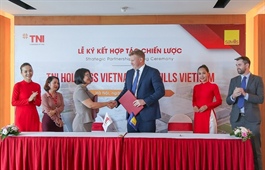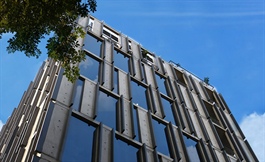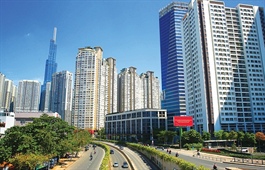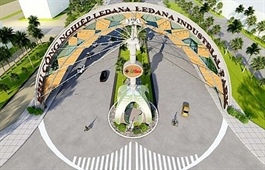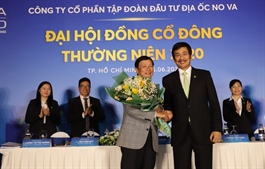Japanese investors lead M&A in real estate market
Japanese investors lead M&A in real estate market
Despite significant deals from Japanese investors during the first five months of the year, the development of mergers and acquisitions in real estate remains uncertain in the second half of the year due to the long-term impact of the coronavirus pandemic.
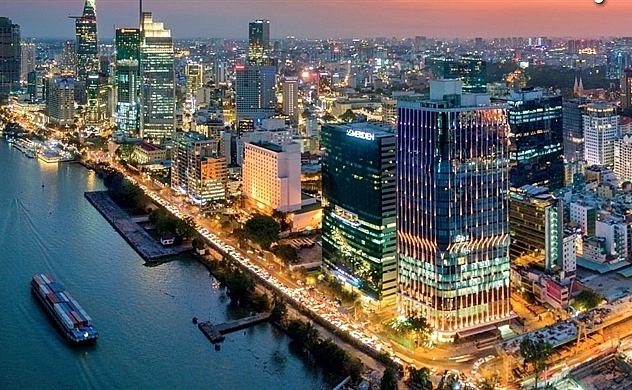
Real estate M&As in Vietnam remain attractive to Japanese buyers
|
In January, Mitsubishi Corporation and Nomura Real Estate Co., Ltd. acquired the majority shares (80 per cent) of the Grand Park Project by Vinhomes, including over 10,000 units of condominiums in Ho Chi Minh City.
According to Mitsubishi, this township covers approximately 365 hectares in total and will include offices, residences, sports and commercial facilities, schools, hospitals, and parks for about 200,000 people.
Not being a newcomer in Vietnam’s M&A market, Mitsubishi had previously co-operated with local property developer Bitexco to create 240 low-rise housing units and two high-rise condominiums out of a proposed total of more than 1,000 low-rises and 17 high-rises at The Manor Central Park project in Hanoi. In Ho Chi Minh City, the company is also involved in a range of projects developed by ¬domestic Phuc Khang Group.
Meanwhile, Nomura Real Estate Group had acquired 24 per cent stakes in Sun Wah Tower in addition to the Zen Plaza office building in the heart of Ho Chi Minh City. Moreover, Nomura co-operated with Phu My Hung Development Corporation to develop the Midtown Phu My Hung Complex in the city’s District 7.
Under its new medium- to long-term management plan, which runs until March 2028, Nomura plans to invest approximately ¥300 billion ($2.7 billion) in overseas businesses including in Thailand, Vietnam, the Philippines, and China.
Elsewhere, Haseko Corporation reached an agreement to acquire a 36 per cent stake in the Vietnamese construction firm Ecoba in May. Haseko is one of the leading condominium contractors and development corporations in Japan with total assets of up to $6.8 billion. The company has built a total of around 580,000 condominium units, approximately 10 per cent of the total number of condominium units on the Japanese market.
According to Masataka Sam Yoshida, head of the cross-border division and CEO at Vietnam RECOF Corporation, there are two types of Japanese investors who are currently present in Vietnam.
“Especially in the real estate sector, one would invest on a corporate level, focusing on real estate developers, while the other one would invest into specific development projects. In general, most Japanese favour the latter type as projects are simpler to manage and more visible. Meanwhile, since it is not easy to see all the inside of a corporation, the potential risk is higher,” Sam Yoshida told VIR.
Nevertheless, Japanese investors have been searching appropriate target projects in vain recently as local developers remained impatient to go with the time-consuming research process.
“The increase of Japanese investments will be rather dependent on the strategies of local developers, the price of the land (not to go up too much), and the speed and volume of approvals to be issued by the authorities,” said Sam Yoshida.
Decent performance
With the mergers and acquisitions (M&A) achieved in the first five months, Vietnam’s real estate market saw positive signs from foreign investors.
According to Phan Xuan Can, chairman of real estate consulting firm Soho Vietnam, one of the best times for M&A hunters is when the market is in crisis.
“Many individuals and investment funds have ordered me to search for new assets, particularly for office buildings, and small- and medium-sized hotels and resorts with a total investment of about VND8-10 billion ($350 to $430 million),” Can disclosed.
Stephen Wyatt, country head of JLL Vietnam also said that the investment thesis and key fundamentals for Vietnam remain positive although some investors might be hesitant on their investment decisions due to the impact of COVID-19.
“Domestic and foreign investors continue to look for opportunities, particularly in the industrial, office, and residential sectors. The country’s rapid response to the pandemic will undoubtedly elevate Vietnam to a new level and we expect to see investment volumes pick up, once travel restrictions are lifted,” he said.
Uncertainty remains
Even though the market saw positive signs in the first five months, the second half of the years is expected to remain uncertain.
Sam Yoshida from RECOF said that M&A activities in the second half of 2020 would not be easy to predict due to the adjustment needed between the negative impact of the pandemic and the needs for economic recovery which will have different procedures in each country and sector.
“In addition to that, the hurdles that the market will have to overcome are not only the strict regulations at each country’s border gates, which will physically prevent investors to examine prospective projects, but also the local side willingness to see the results of the coming election in early 2021,” Yoshida said.
Therefore, according to Sam Yoshida, Japanese investors can further be divided into two more groups. One group includes those who would want to follow the traditional way to “wait and see” until after the storm has passed.
The other group, which is increasing among their customers, will include those who would want to grasp this opportunity to take advantage of having less competing buyers; not because they want to buy cheap but because they want to find the best possible partner from wider choice for their valuable expansion in the region.




